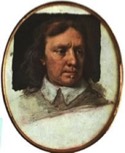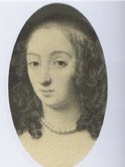Clement-Jones family - Person Sheet
Clement-Jones family - Person Sheet
Birth1599
Death1658
EducationHuntingdon grammar School, Sidney Sussex Cambridge
FatherRobert CROMWELL , 1819 (1560-1617)
MotherElizabeth STEWARD , 1871 (-1654)
Notes for Oliver CROMWELL
The Lord Protector.
Entry from Wikipedia.
Oliver Cromwell was an English military and political leader best known for his involvement in making England, Scotland and Ireland into a republican Commonwealth and for his conquest of Ireland. He was born in Huntingdon, seventy miles north of London, into the ranks of the middle gentry, and remained relatively obscure for his first forty years, slipping down to the level of yeoman farmer for a number of years in the 1630s due to personal and financial circumstances. However, he returned to the ranks of the gentry thanks to an inheritance from his uncle. A religious conversion experience during the same decade made an Independent style of Puritanism a core tenet of his life and actions.
Cromwell was returned to Parliament as Member of Parliament (MP) for Cambridge in the Short (1640) and Long (1640-49) Parliaments, and later entered the English Civil War on the side of the Roundheads or "Parliamentarians". A brilliant soldier (nicknamed "Old Ironsides") he rose from leading a single cavalry troop to eventual command of the entire army. Cromwell was the third person to sign Charles I's death warrant in 1649 and was an MP in the Rump Parliament (1649-1653), being chosen by the Rump to take command of the English campaign in Ireland during 1649-50. He then led a campaign against the Scottish army between 1650-51. On 20 April 1653 he dismissed the Rump Parliament by force, setting up a short-lived nominated assembly known as the Barebone's Parliament before being made Lord Protector of England, Scotland, and Ireland on December 16, 1653 until his death. When the Royalists returned to power in 1660, his corpse was dug up, hung in chains, and beheaded.
Cromwell's career is full of contradictions. He was a regicide who agonised over whether to accept the crown's legitimacy. He was a parliamentarian who ordered his soldiers to dissolve parliaments. Under his rule, the Protectorate advocated religious liberty of conscience (not to be confused with freedom of religion) but allowed blasphemers to be tortured. He advocated equitable justice but imprisoned those who criticised his raising taxation outside the agreement of Parliament. Admirers hail him as a strong, stabilising and stately leader who brought international respect, overthrew tyranny and promoted republicanism and liberty, whilst critics ridicule him as an overly ambitious hypocrite who betrayed the cause of liberty, imposed puritanical values and showed scant respect for the nation's traditions.
Cromwell has been a very controversial figure in history of Britain and Ireland—a regicidal dictator to some historians (such as David Hume and Christopher Hill) and a hero of liberty to others (such as Thomas Carlyle and Samuel Rawson Gardiner). In Britain he is held in high esteem, being elected as one of the Top 10 Britons of all time in a BBC poll. However, his measures against Irish Catholics have been characterised by some historians as genocidal or near-genocidal, and in Ireland itself he and his memory are widely despised.
Entry from Wikipedia.
Oliver Cromwell was an English military and political leader best known for his involvement in making England, Scotland and Ireland into a republican Commonwealth and for his conquest of Ireland. He was born in Huntingdon, seventy miles north of London, into the ranks of the middle gentry, and remained relatively obscure for his first forty years, slipping down to the level of yeoman farmer for a number of years in the 1630s due to personal and financial circumstances. However, he returned to the ranks of the gentry thanks to an inheritance from his uncle. A religious conversion experience during the same decade made an Independent style of Puritanism a core tenet of his life and actions.
Cromwell was returned to Parliament as Member of Parliament (MP) for Cambridge in the Short (1640) and Long (1640-49) Parliaments, and later entered the English Civil War on the side of the Roundheads or "Parliamentarians". A brilliant soldier (nicknamed "Old Ironsides") he rose from leading a single cavalry troop to eventual command of the entire army. Cromwell was the third person to sign Charles I's death warrant in 1649 and was an MP in the Rump Parliament (1649-1653), being chosen by the Rump to take command of the English campaign in Ireland during 1649-50. He then led a campaign against the Scottish army between 1650-51. On 20 April 1653 he dismissed the Rump Parliament by force, setting up a short-lived nominated assembly known as the Barebone's Parliament before being made Lord Protector of England, Scotland, and Ireland on December 16, 1653 until his death. When the Royalists returned to power in 1660, his corpse was dug up, hung in chains, and beheaded.
Cromwell's career is full of contradictions. He was a regicide who agonised over whether to accept the crown's legitimacy. He was a parliamentarian who ordered his soldiers to dissolve parliaments. Under his rule, the Protectorate advocated religious liberty of conscience (not to be confused with freedom of religion) but allowed blasphemers to be tortured. He advocated equitable justice but imprisoned those who criticised his raising taxation outside the agreement of Parliament. Admirers hail him as a strong, stabilising and stately leader who brought international respect, overthrew tyranny and promoted republicanism and liberty, whilst critics ridicule him as an overly ambitious hypocrite who betrayed the cause of liberty, imposed puritanical values and showed scant respect for the nation's traditions.
Cromwell has been a very controversial figure in history of Britain and Ireland—a regicidal dictator to some historians (such as David Hume and Christopher Hill) and a hero of liberty to others (such as Thomas Carlyle and Samuel Rawson Gardiner). In Britain he is held in high esteem, being elected as one of the Top 10 Britons of all time in a BBC poll. However, his measures against Irish Catholics have been characterised by some historians as genocidal or near-genocidal, and in Ireland itself he and his memory are widely despised.



